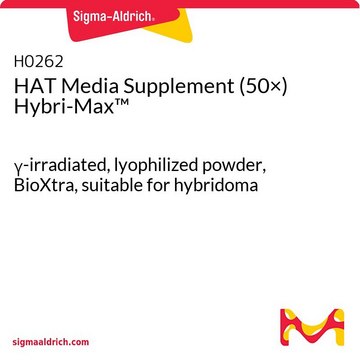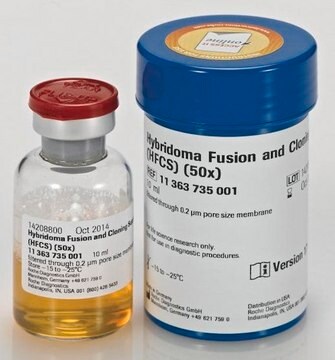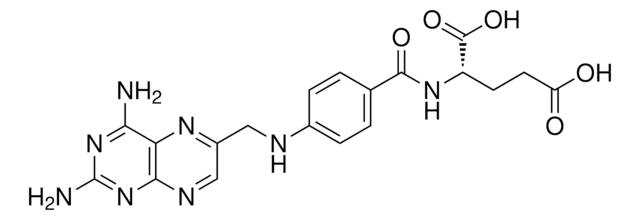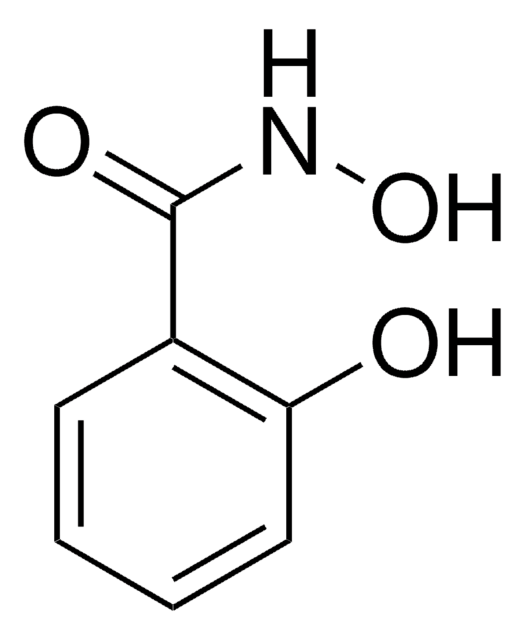P7306
Polyethylene glycol/ dimethyl sulfoxide solution
Hybri-Max™, average mol wt 1,450, 50 % (w/v), 0.2 μm filtered, BioReagent, suitable for hybridoma
Synonym(s):
PEG/DMSO Solution, Polyethylene Glycol Solution, Solution of PEG and DMSO
Sign Into View Organizational & Contract Pricing
All Photos(1)
About This Item
Recommended Products
grade
Hybri-Max™
Quality Level
sterility
0.2 μm filtered
product line
BioReagent
form
solution
mol wt
average mol wt 1,450
concentration
50 % (w/v)
technique(s)
cell culture | hybridoma: suitable
impurities
endotoxin, tested
storage temp.
2-8°C
SMILES string
C(CO)O
InChI
1S/C2H6O2/c3-1-2-4/h3-4H,1-2H2
InChI key
LYCAIKOWRPUZTN-UHFFFAOYSA-N
Application
PEG is used as a fusogen to obtain hybridomas for monoclonal antibody production. Induces cell hybridization.
Recommended for use in a normal fusion protocol requiring 50% PEG and 10% DMSO.
Recommended for use in a normal fusion protocol requiring 50% PEG and 10% DMSO.
Packaging
Packaged in sealed ampules under nitrogen.
Other Notes
Contains 50% (w/v) polyethylene glycol (Av. Mol. Wt. 1450) and 10% DMSO (v/v) in DPBS without Calcium.
Reconstitution
Solution is ready-to-use. If a less concentrated solution is desired, dilute with sterile DPBS without calcium (D5773). Some precipitate may appear after being exposed to cooler, but should disappear as the solution warms. Solution may be frozen if desired but should first be aliquotted to avoid repeated freeze/thaw cycles.
Legal Information
Hybri-Max is a trademark of Sigma-Aldrich Co. LLC
Storage Class Code
10 - Combustible liquids
WGK
WGK 1
Flash Point(F)
Not applicable
Flash Point(C)
Not applicable
Choose from one of the most recent versions:
Already Own This Product?
Find documentation for the products that you have recently purchased in the Document Library.
Customers Also Viewed
Wen-Hung Chen et al.
Virology journal, 14(1), 189-189 (2017-10-04)
Dengue virus (DV) infection causes a spectrum of clinical diseases ranging from dengue fever to a life-threatening dengue hemorrhagic fever. Four distinct serotypes (DV1-4), which have similar genome sequences and envelope protein (E protein) antigenic properties, were divided. Among these
Wei Guo et al.
Neurobiology of disease, 132, 104590-104590 (2019-08-31)
While Brain-derived Neurotrophic Factor (BDNF) has long been implicated in treating neurological diseases, recombinant BDNF protein has failed in multiple clinical trials. In addition to its unstable and adhesive nature, BDNF can activate p75NTR, a receptor mediating cellular functions opposite
Indre Kucinskaite-Kodze et al.
Biomolecules, 10(7) (2020-07-12)
The pathogenicity of many bacteria, including Streptococcus pneumoniae, depends on pore-forming toxins (PFTs) that cause host cell lysis by forming large pores in cholesterol-containing cell membranes. Therefore, PFTs-neutralising antibodies may provide useful tools for reducing S. pneumoniae pathogenic effects. This
Liliana R Loureiro et al.
Scientific reports, 8(1), 12196-12196 (2018-08-17)
Incomplete O-glycosylation is a feature associated with malignancy resulting in the expression of truncated glycans such as the sialyl-Tn (STn) antigen. Despite all the progress in the development of potential anti-cancer antibodies, their application is frequently hindered by low specificities
Sondra T Bland et al.
Brain, behavior, and immunity, 23(4), 492-497 (2009-06-03)
Glial activation has recently been discovered to modulate several effects of morphine, including analgesia, tolerance, and dependence. The present studies extend this line of investigation by exploring whether glial activation may also affect extracellular levels of dopamine (DA) in the
Our team of scientists has experience in all areas of research including Life Science, Material Science, Chemical Synthesis, Chromatography, Analytical and many others.
Contact Technical Service








